Last updated on August 15th, 2024
When it comes to travel, Gen X and Boomer women are key influencers
by Carolyn Ray, JourneyWoman
Women make 80 to 85 percent of travel decisions and comprise two-thirds of all travellers. Our impact is significant – and it goes well beyond our role as travel consumers. As we look at a post-pandemic world, mature women matter in travel. As women, particularly GenX and Boomer women – we have the opportunity to reframe travel that have the potential to change how, when and why we travel.
According to the most recent Global Report on Women in Tourism, published by the UN World Tourism Organization (UNWTO) in November 2019, 54 per cent of people employed globally in tourism are women. Tourism also affects the lives of women living in tourism destinations, empowering women as we work toward gender equality. Tourism contributes to the UN’s Sustainable Development Goal Number 5: “To achieve gender equality and empower all women and girls.”
Pre-pandemic, tourism was one of the fastest-growing and most important economic sectors in the world, benefitting destinations and communities worldwide, representing an estimated 10 per cent of the world’s GDP and 1 in 10 jobs globally.
Up until now, we have been the beneficiaries of a healthy travel environment. But as we watch the massive shifts happening in the tourism industry, the question I ask myself is: “How do we actively participate in rebuilding and reshaping the industry, knowing that our participation and contribution is and will continue to be significant?”
If there is one thing we’ve learned in this time, it’s that we are all connected and interdependent on each other for our livelihoods, if not our very survival.
Mature women matter in travel
In late May and early June 2020, we conducted an online study and invited women passionate about travel to participate. Our objective was to assess shifts in travel, including the impact of the pandemic on decision-making criteria, reputation and trust, and destination choice – all from a woman’s perspective. We called this global study “Embracing the Unknown: The Risk and Reward of Travel.” Over 1,500 women in the highly influential 55-75+ demographic participated from over 30 countries. Most of our respondents were from the US (51%), Canada (39%) and Australia (9%). I then conducted three well-attended focus groups to discuss the key findings near the end of June.
These women age 55+ – categorized as Gen Xers and Baby Boomers – are powerful. They (YOU!) influence their friends and families and their children and grandchildren. They inspire other women to join their ranks. They also hold the most purchasing power of any demographic, spending thousands per week on multiple trips per year.
Yet these women are also the most vulnerable to the pandemic – which is why almost three-quarters of them (73 per cent) would pay more simply to feel safe.
The pandemic created trust issues for women
What we found in our research was universally expressed – there is a lack of trust that is inhibiting women’s decisions about travel.
Trust works two ways. First, we need to trust the source of information. Then, we need to trust that that information is being executed upon, that what is said is delivered in the promised experience. These are both fundamental to how women make decisions.
During the initial months of the pandemic, the industry fell short of its responsibility to impart information in a way that reassured women. Now, there is no plausible reason why the industry isn’t adhering to the advice and counsel of those who are the most trusted – our medical and healthcare officials.
There are signs of positive developments, but frankly, when airlines sell middle seats after committing to put safety first, they’re not paying attention to the medical experts.
This say-do gap creates an erosion of trust that affects the entire industry, even when these incidents may be the deviation, not the norm. After all, perception is reality, and it’s often exaggerated in the media.
In our research, women ranked the insurance sector at the lowest level of any travel service industry. In an industry that has perfected the unenviable task of assessing human risk, this industry has developed what must be one of the world’s most complex business models, one that is designed to protect the insurance firm, not the traveller. It’s even more confusing when the traveller is asked to conform to their criteria instead of serving our needs. With the pandemic, that contract has been flipped on its head, putting tremendous stress on the industry – its ability to serve clients and deliver products that meet client needs. Going forward, insurance is no longer optional, yet the profile of insurance companies is denial, which does incredible harm to reputation and the expressed desire to protect people when disaster occurs.
Who to Trust—the Erosion of Reputation
Key Findings:
- When it comes to sources of information, women place their trust in medical professionals, public healthcare authorities and healthcare organizations such as the World Health Organization (WHO). Canadians were found to be more trusting of government while Americans are more likely to trust social media.
- Most respondents believe that travel-related businesses have not done a good job of managing reputation during COVID-19. When asked who has done a poor, acceptable or good job managing reputation, only hotels ranked as net positive. Airlines and insurance companies were seen to have done a poor job overall.
- Handling of COVID-19 by states/ provinces are viewed as neutral for Canadians but are considerably negative for Americans.
The Erosion of Reputation
When we asked women about how businesses have performed during COVID-19, hotels were seen to have performed the best to date, well ahead of states, cities, airports, airlines and even countries.
Many hotels, such as the Four Seasons and Hilton, have begun programs in partnership with medical experts such as John Hopkins Medicine International and the Mayo Clinic to introduce increased sanitization and social distancing measures. One must hope that these larger hotel chains can set a new standard that will be followed by the smaller hotels and resorts preferred by women in our study.
Experienced travellers have seen it all and tend toward cynicism. To feel safe, testimonial evidence from other women and communities such as JourneyWoman are far more believable than marketing claims.
One woman in a focus group said: “I have to see people I know and trust who have been able to experience the cleanliness of the planes and hotels before I’m comfortable risking my life.” Another said: “As a single parent traveller with my daughter, I will tap into local people in the communities. I will not rely on tourism boards or airlines, tourist groups, hotel executives. They have an ulterior motive. I would ask friends on the ground or friends of friends what they say.”
This erosion of reputation factors into a lack of confidence, and a hesitation which is exhibited through a postponement of travel for 2020, now further aggravated by a disorganized national solution in the US that is failing to stem the spread of the disease. It is incumbent on government and the industry to recognize its own failings and demonstrate through their actions the remedies required to regain the trust of the woman traveller.
Women want to travel safely
As we look to the future, it is clear that women must exercise our advocacy more emphatically and visibly. It’s not a new behaviour for us, but one that needs to be accentuated to affect long-term change. Even if a vaccine is found, this isn’t over. The responsibility for safety falls on our shoulders.
Risk is a strange beast. If we know the exact outcome, there’s no risk. But if the path is unknown due to its complexity, it creates uncertainty. There are three dimensions of risk: the nature of the risk (is it unknowable or knowable?); our perception of risk (how good are we at evaluating risk, based on our experience); and third, how confident are we in our ability to withstand risk (in other words, the consequences of our decisions). Sometimes we can be held back by our own fears if we don’t properly understand risk. We can overestimate it or underestimate it. Age, gender and experience all affect perceptions of risk. In uncertain times, as more information comes in, the perception of risk changes too.
From our study, we know that women want more information, not less and that they will depend on trusted sources close to them to make decisions. The traditional decision-making process has typically focused on the destination itself, less the route to get there, but this will change now.
Even though women still seek new, off-the-beaten-track destinations, they told us they will make decisions based on transportation in and out of that destination and the kind of healthcare they can expect. Questions like: ‘What are the options for quarantine? What expertise is on the ground in our destinations and available along the way?’ will become more important in the overall decision to travel.
There is anxiety about the lack of control over accommodation, resulting in a desire for more intimate, personalized experiences. In our study, 82 per cent said they would not venture on to a cruise ship, and only 40 per cent would visit a large resort.
This shift from big to small is consistent with the view that we want and expect personal assurances that safety and cleanliness is a top priority. Elevators, public spaces and lobbies are a seen as a breeding ground for problems. Relinquishing accountability is no longer acceptable – the more you’re taking personal responsibility for the decisions you make, the more you want to see visible validation.
Key Findings:
How to Travel—the New Criteria
- In the study, the majority of respondents are not planning to travel internationally until 2021, with most planning to wait until the second half of 2021.
- Women still want to pursue their ‘bucket list’, with most eager for new, undiscovered destinations. However, they are seeking less populated places and using new criteria, including transportation in and out of a destination, access and quality of healthcare and a country’s handling of COVID-19, to make decisions.
- Over 71% of women typically purchase travel insurance, with comprehensive insurance the most popular. Americans are more likely to take no insurance or just trip cancellation insurance, whereas Canadians are more likely to take just medical insurance.
What will the world look like in a year?
We will travel again, but it’s going to be different than it was before, even when there is a vaccine. Will the world snap back to what it was, or will we have a new set of criteria and expectations about what tourism looks like in the future?
The allure of travel to feed our curiosity, satisfy our desire to learn, and challenge our own definition of self-discovery and adventure grants us the privileged opportunity to expand our understanding of the world we all share. Travel feeds our imagination, enriches our vocabulary, validates our values and enlists our contribution to protect and preserve the magnificence of our world for future generations.
We nourish our souls through travel, through the mosaic of humanity that we experience. Travel fosters tolerance, teaches compassion, incites joy, and emboldens confidence.
Earlier, I mentioned that Mother Nature is not a millennial. But she, like women, is nurturing, empathetic and compassionate. This is a time to take stock of what’s important and correct the abuse we’ve imposed on our beautiful blue planet.
As we consider the future, it’s my hope that we’ll be more intentional in our choices. We have this time to learn and question things that we’ve taken for granted for a long time. We can make informed choices to combat overtourism, climate change, and be more ethical in how we engage with animals and wildlife. And as women, as a united group of human beings, I believe we can do anything when we work together.
It’s hard to know exactly when we’ll feel comfortable travelling internationally again, but when we do, we must take steps to make our world better.
Key Findings:
Where to Go—the Ideal Destination Redefined
- Western Europe and North America remain attractive destinations for Canadian and American women. The first destinations women will travel to outside of their home country, include the United Kingdom, Canada, France, Italy, US and Ireland; 72% will not go to China.
- Interestingly, Canadians’ outlook on the U.S. is negative, whereas domestic travel is overwhelmingly the most attractive for Americans.
- Women prefer to stay with friends and family, small boutiques, Bed and Breakfasts, where travelers have greater control over their environment. Interestingly, Canadians are more negative towards large hotels versus Americans.
- Large cruises did not perform well, with the vast majority (82%) not considering cruises. Forty per cent said they will not stay at large resorts.
- The most important issues that women are concerned about and want more coverage on are: ethical travel and accessible travel.
As women, we are advocates for other women
Women’s voices matter in travel. We don’t have to compromise anything for safety, but there are things we can do to create the best possible travel experience.
1. Support businesses that prioritize people ahead of profits: Our survey showed that many women will not travel until they believe that their safety and health matter more than corporate profits.
One woman said it best: “If people feel confident that safety is the number-one concern, word will get out. Instead of money being the number one thing, the money will follow if you take care of me. My confidence will come back If we are taken care of as travellers.”
2. Support women and women-owned businesses in the tourism industry: Our ethos at JourneyWoman is to empower women through travel. As we consider the future of travel, I believe we have an opportunity to recast many practices that were damaging to the environment, animals and communities. We can work harder to advance the UN Sustainability Goals to support women, equality and women-owned businesses, both in our own countries and those that rely on tourism.
One example of our commitment to this is the small businesses in our Women’s Travel Directory. These women provide small, highly personalized tours for women and take hygiene and bespoke service seriously. Several of the tour operators in our community have launched funding campaigns to help local communities in hard-hit areas such as Kenya and Bali – they realize that we are all connected and dependent on each other.
3. Demand not just transparency, but evidence: We know how important transparency is to trust. Embracing a questioning mind by asking ‘how do you know?’ is a frequent discussion among women. Having a trusted authority can be helpful to resolve concerns about risk, as expert voices can sway behaviour. This is why we’re introducing a Women’s Advisory Council that will support and empower our community with expert, objective advice on topics ranging from health and wellness to financial planning to solo travel and safety.
4. Fight complacency – don’t let down your guard: This is not over. We need to adopt new behaviours that protect us and others. But this kind of change can be exhausting. To avoid fatigue, behavioural scientists note that change needs to be instigated at lots of different levels of society, not just top-down, to move as a whole. As role models and as women, we can demonstrate positivity, optimism and actionable results through our own behaviour.
5. Show gratitude for those doing it right: As Mary Poppins said, a spoonful of sugar helps the medicine go down. As with any behavioural shift (e.g. wearing seatbelts, smoking in public spaces) role models are needed to support positive change and reinforce good behaviours. We invite all women to use our platform as a forward-moving force for good.
Thank you to all the women who participated in this research, and in our three focus groups. It’s your engagement and commitment that makes this all possible!
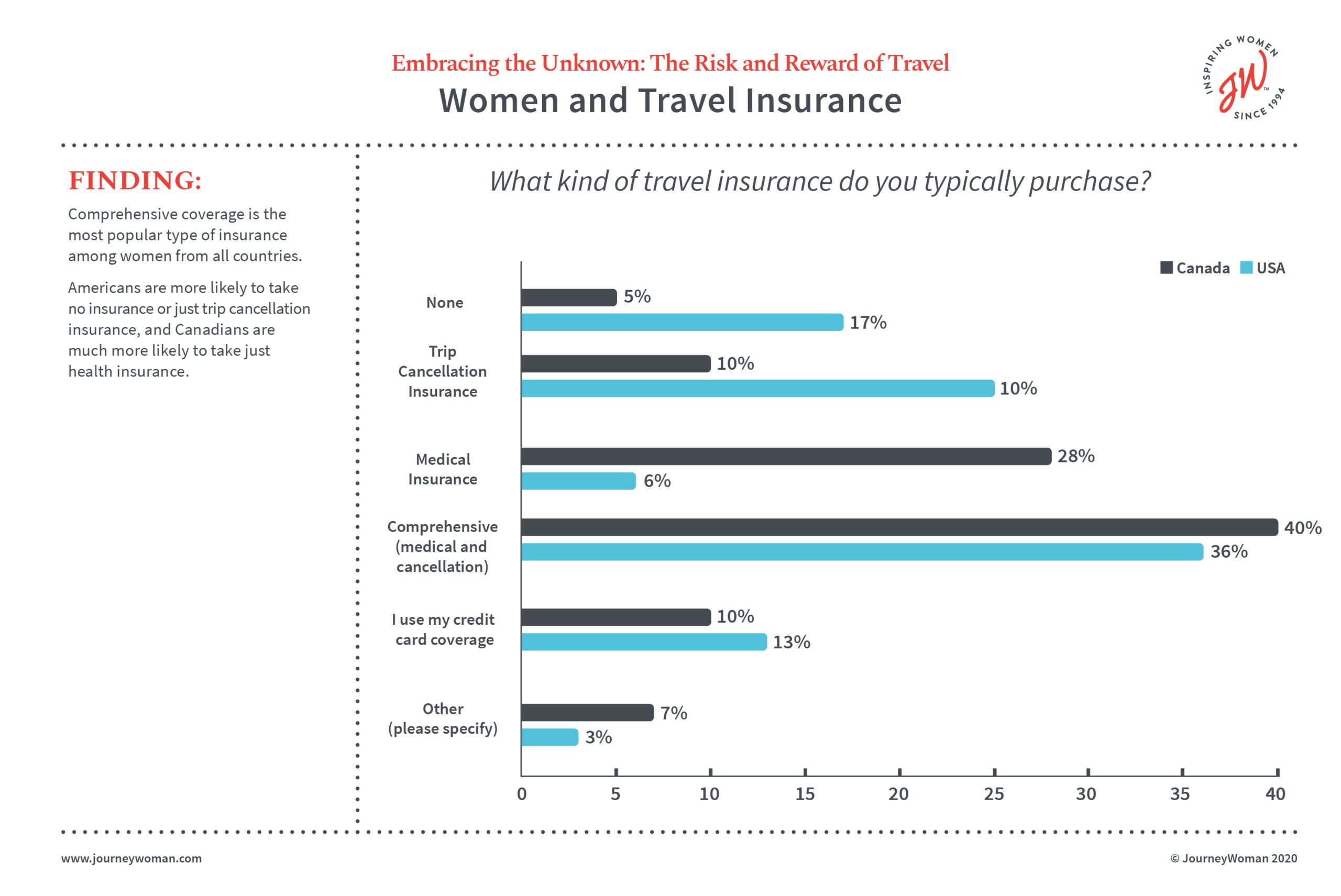


About the Study
The global study, titled “Embracing the Unknown: The Risk and Reward of Travel”, surveyed 1,513 highly experienced women travellers in the highly influential 55-75+ demographic to assess shifts in travel, including the impact on of the pandemic on decision-making criteria, reputation and trust, and destination choice.
This research reflects a primarily North American perspective and offers an on-the-ground look at how the topics often covered at an international or political level are influencing changing perspectives at the personal level of decision-making. It was designed to as a benchmark for perceptions, challenges and opportunities from a woman’s perspective in the midst of COVID-19.
Completed in June, the survey invited experienced women travellers to share perceptions on the risks associated with travel in an online study and in focus groups. The study was conducted based on a representative sample of women. With a sample size of over 1500, the published results are statistically significant at 95-99% confidence. The study methodology, questions and results were analyzed and vetted by an objective third-party analytics expert.

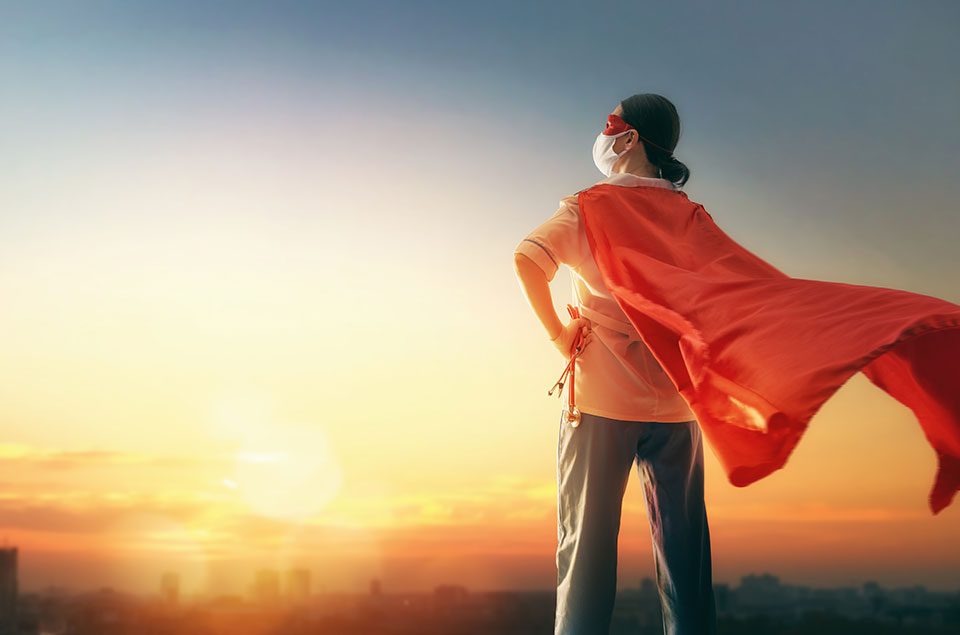

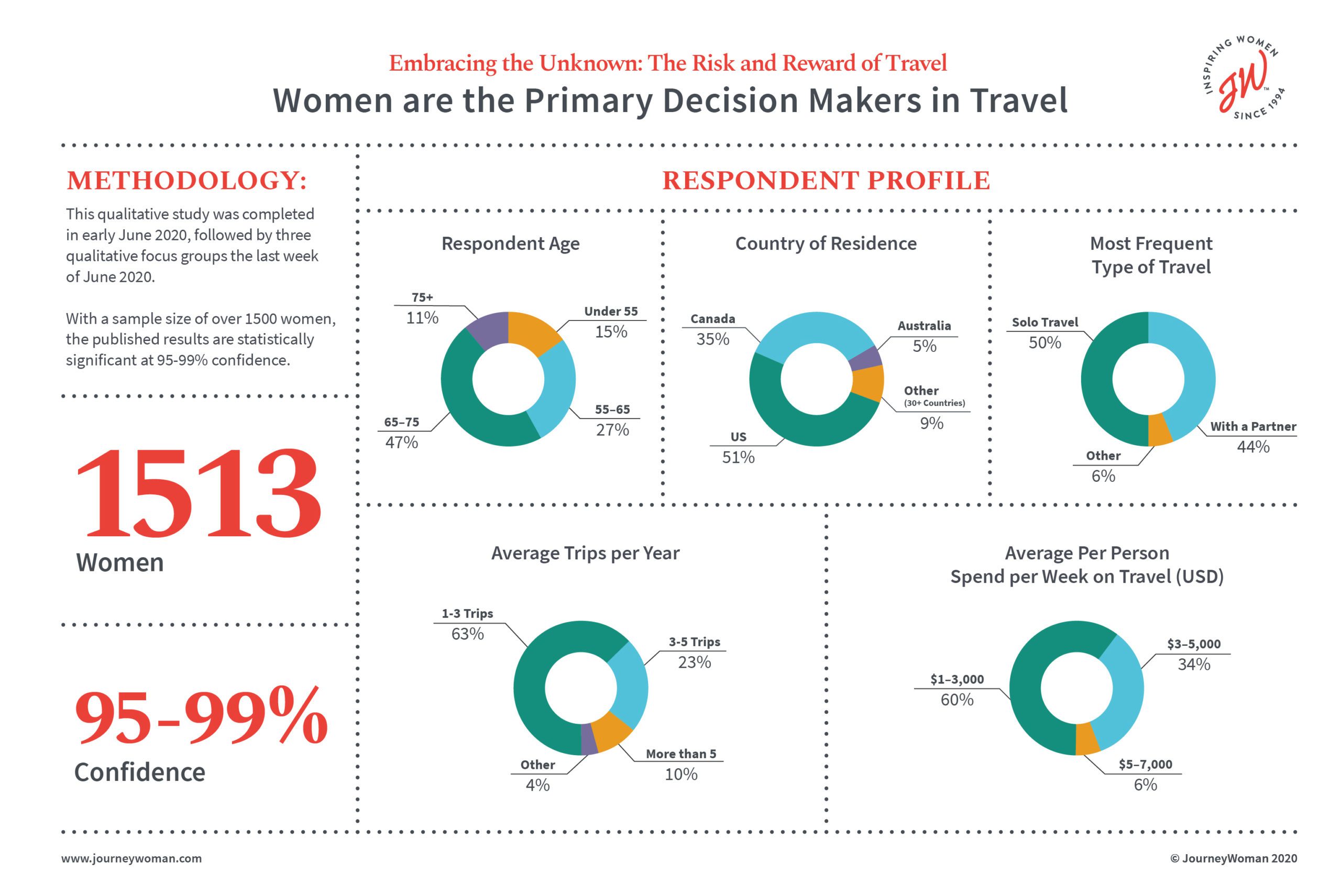
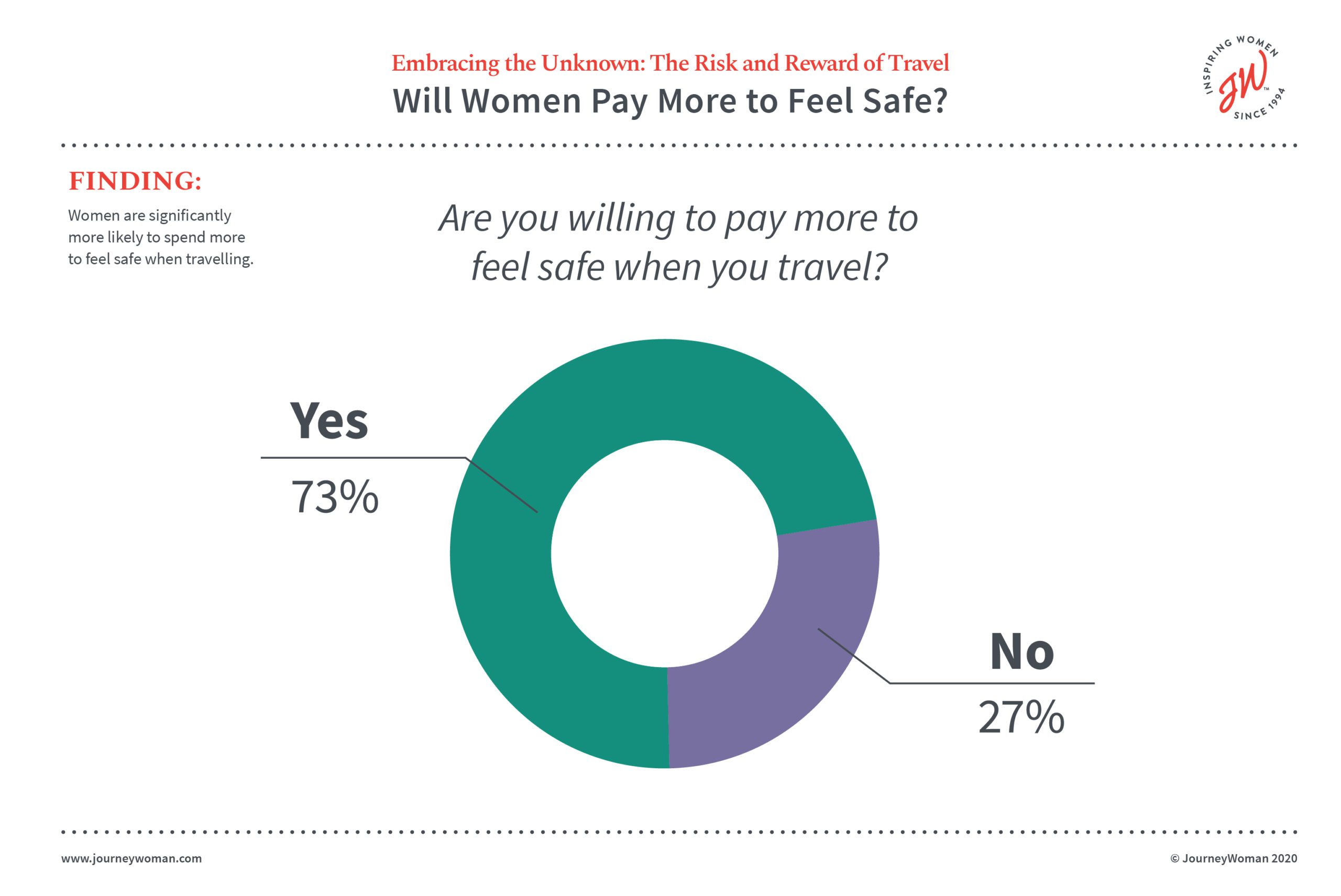
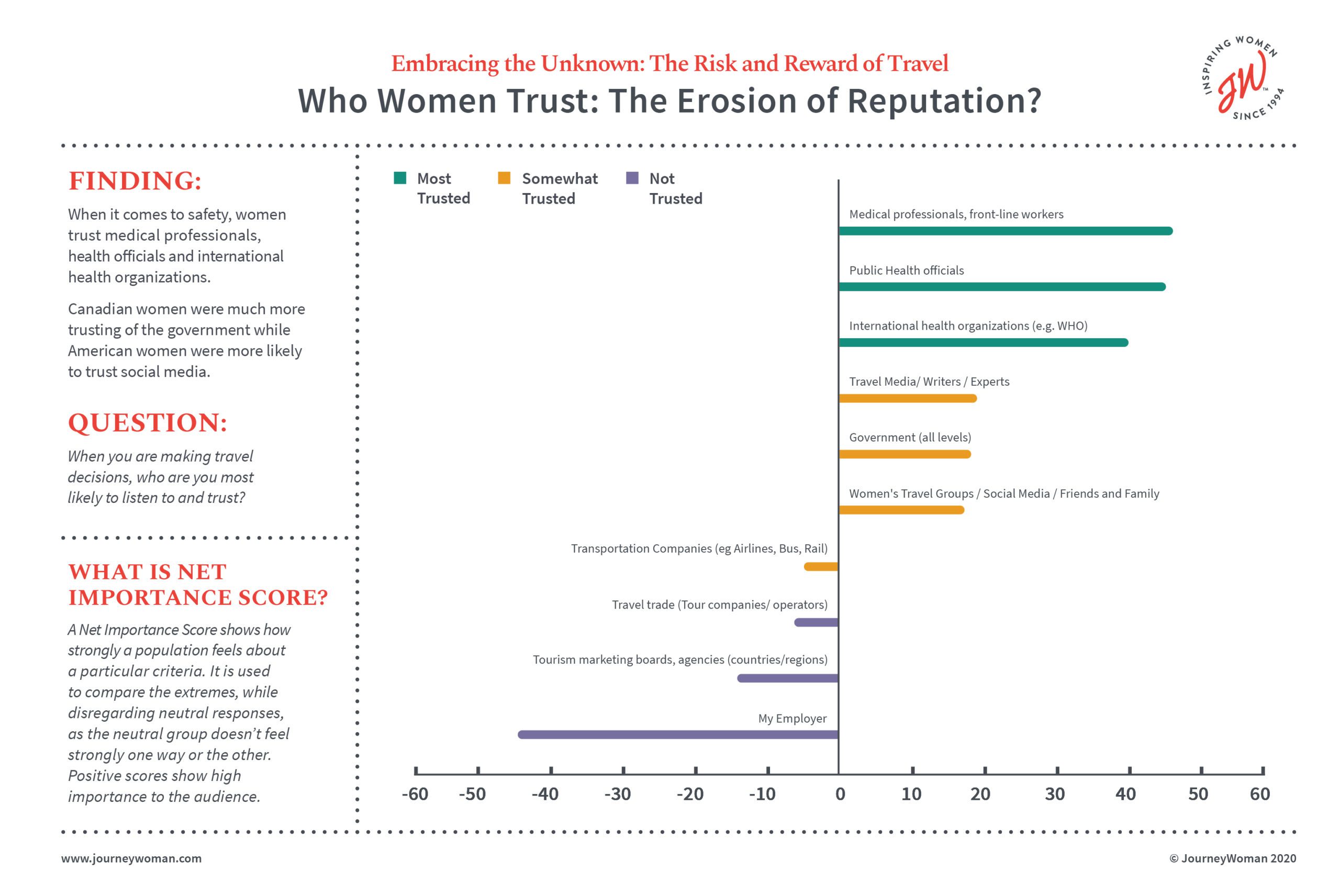
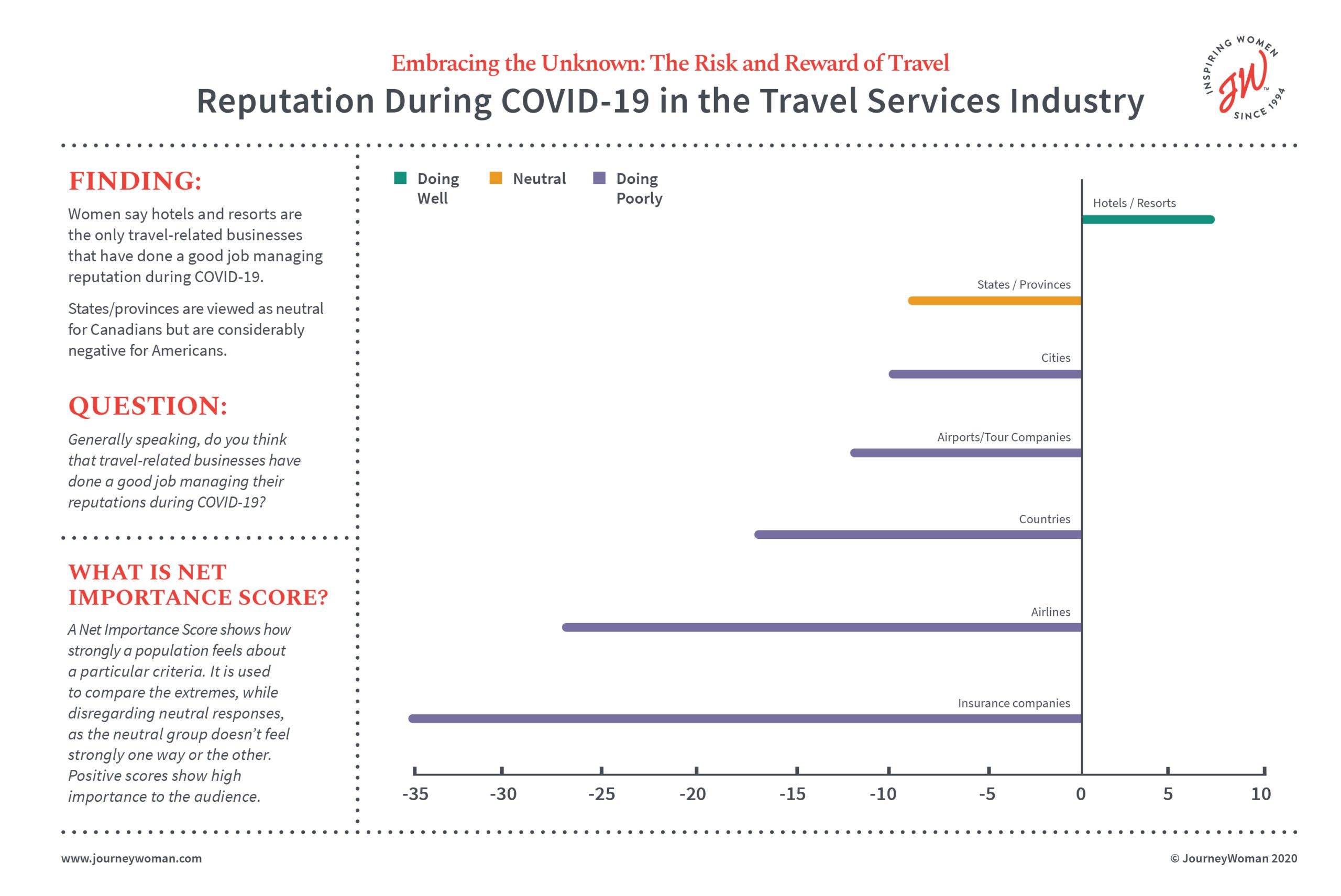
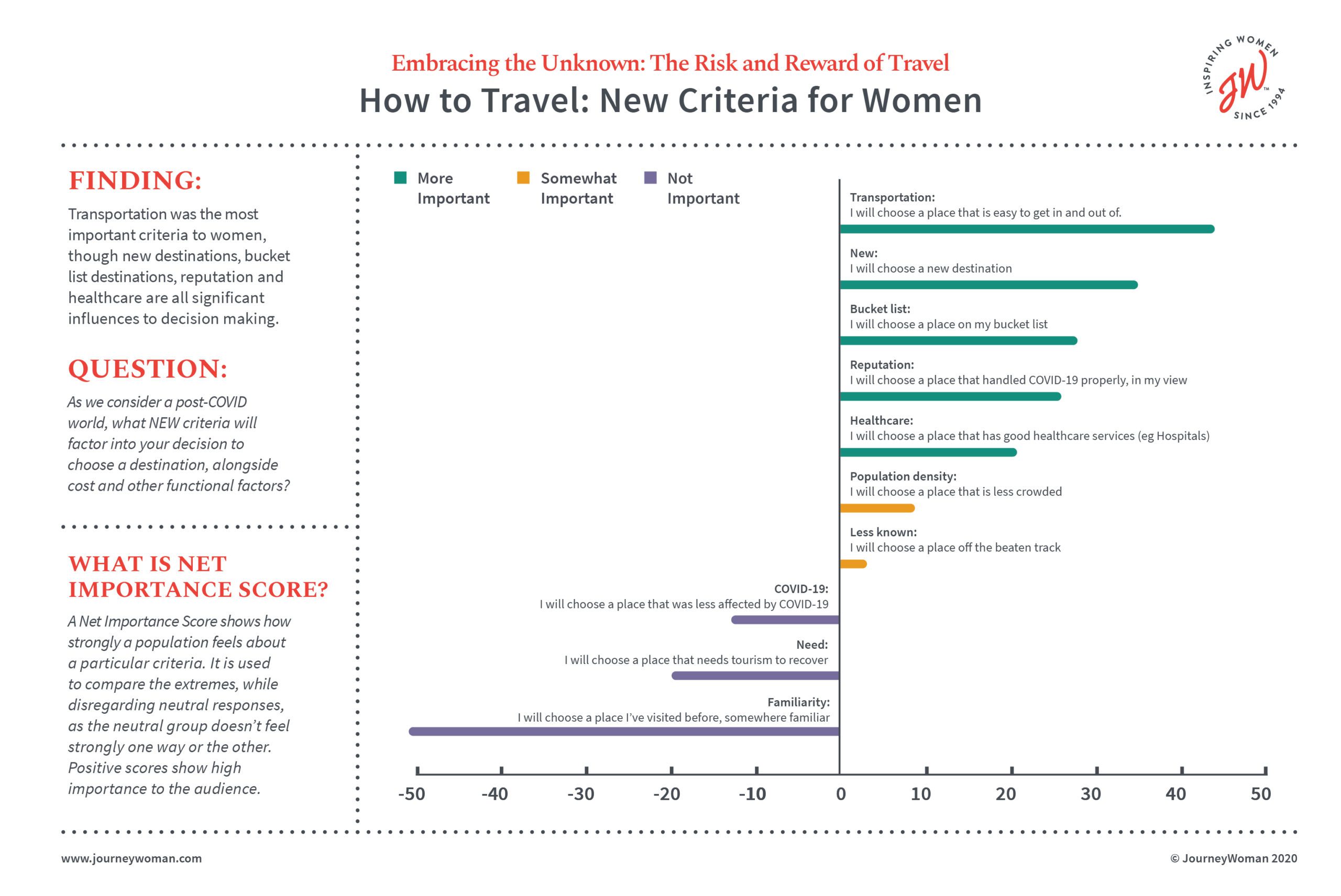
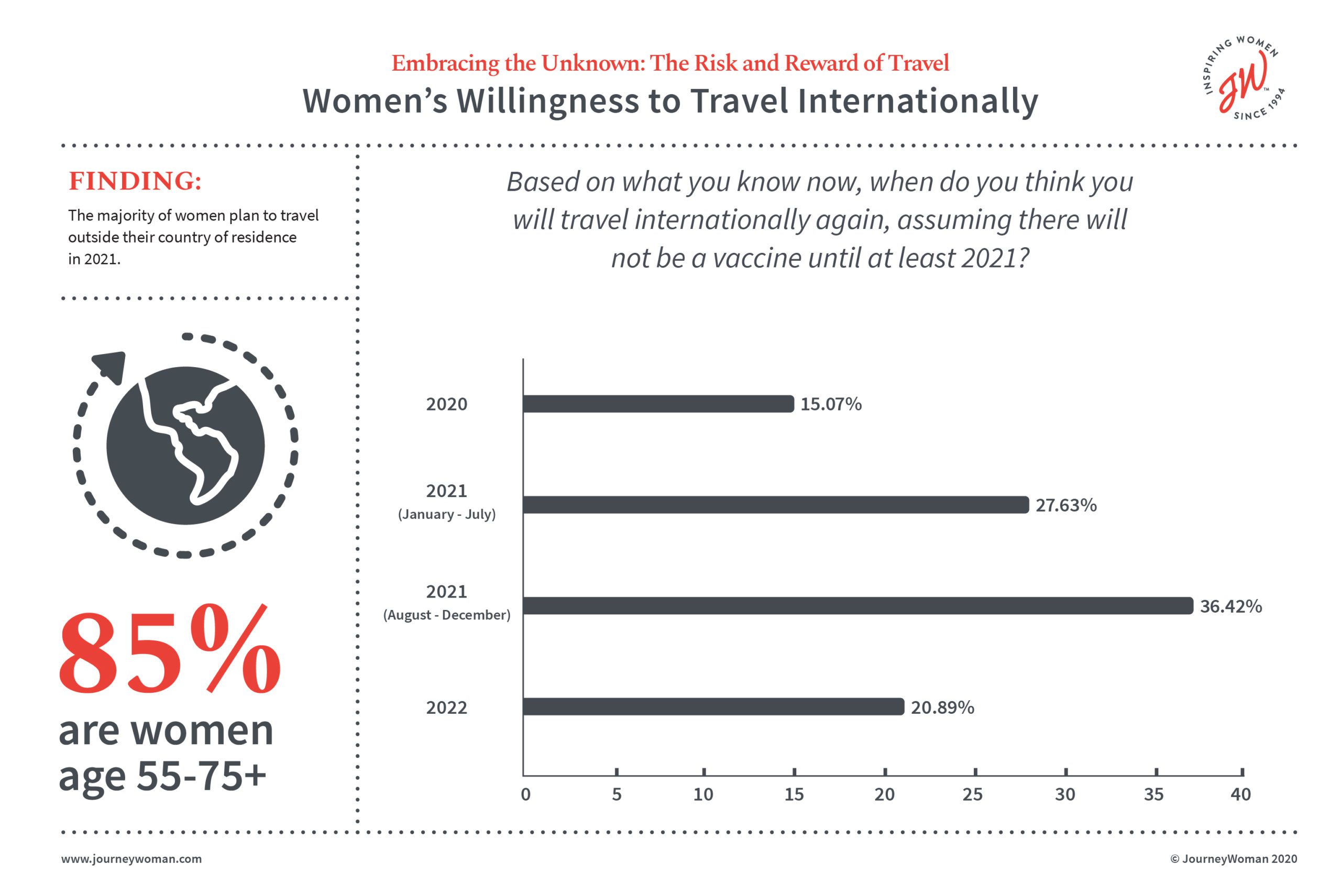
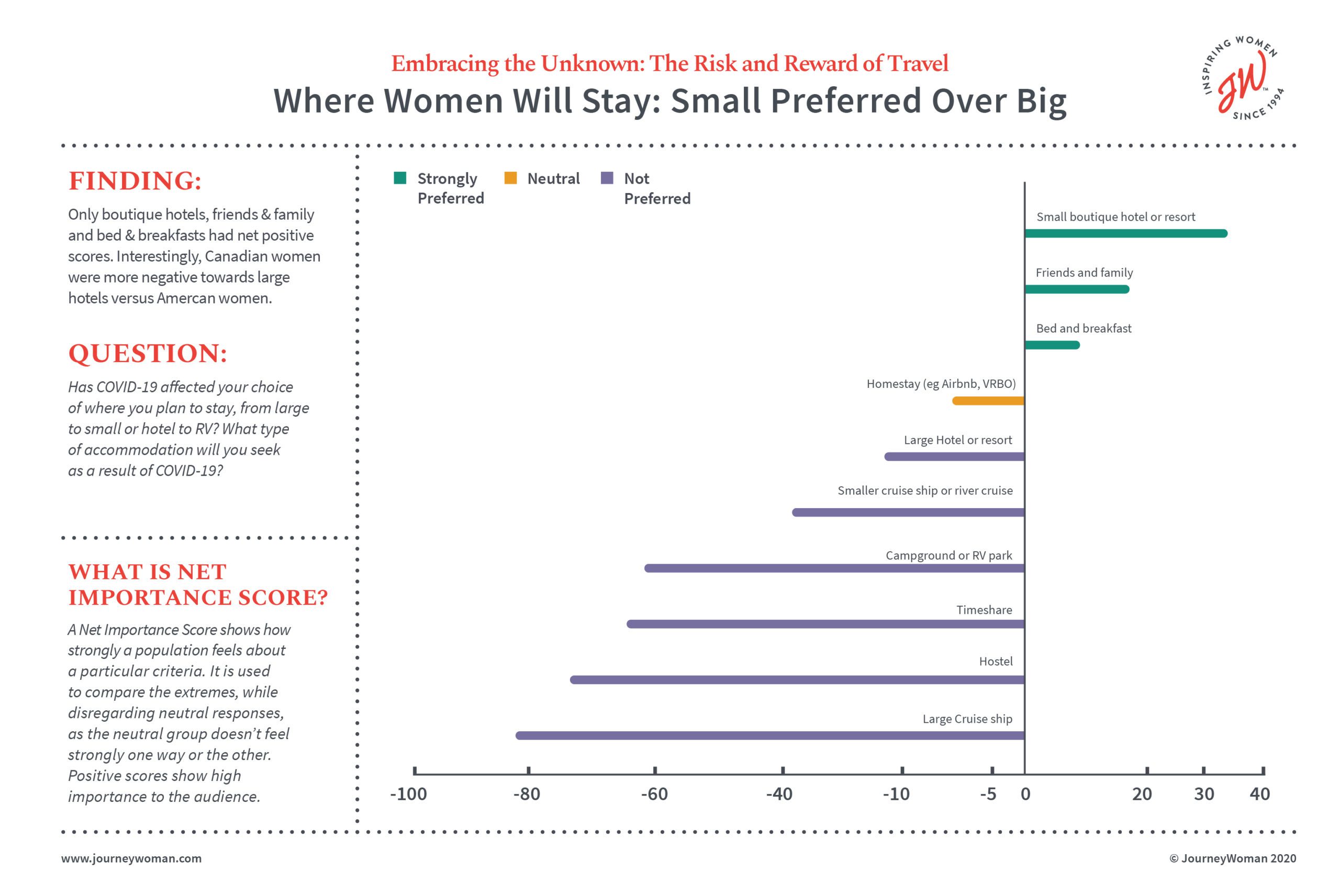
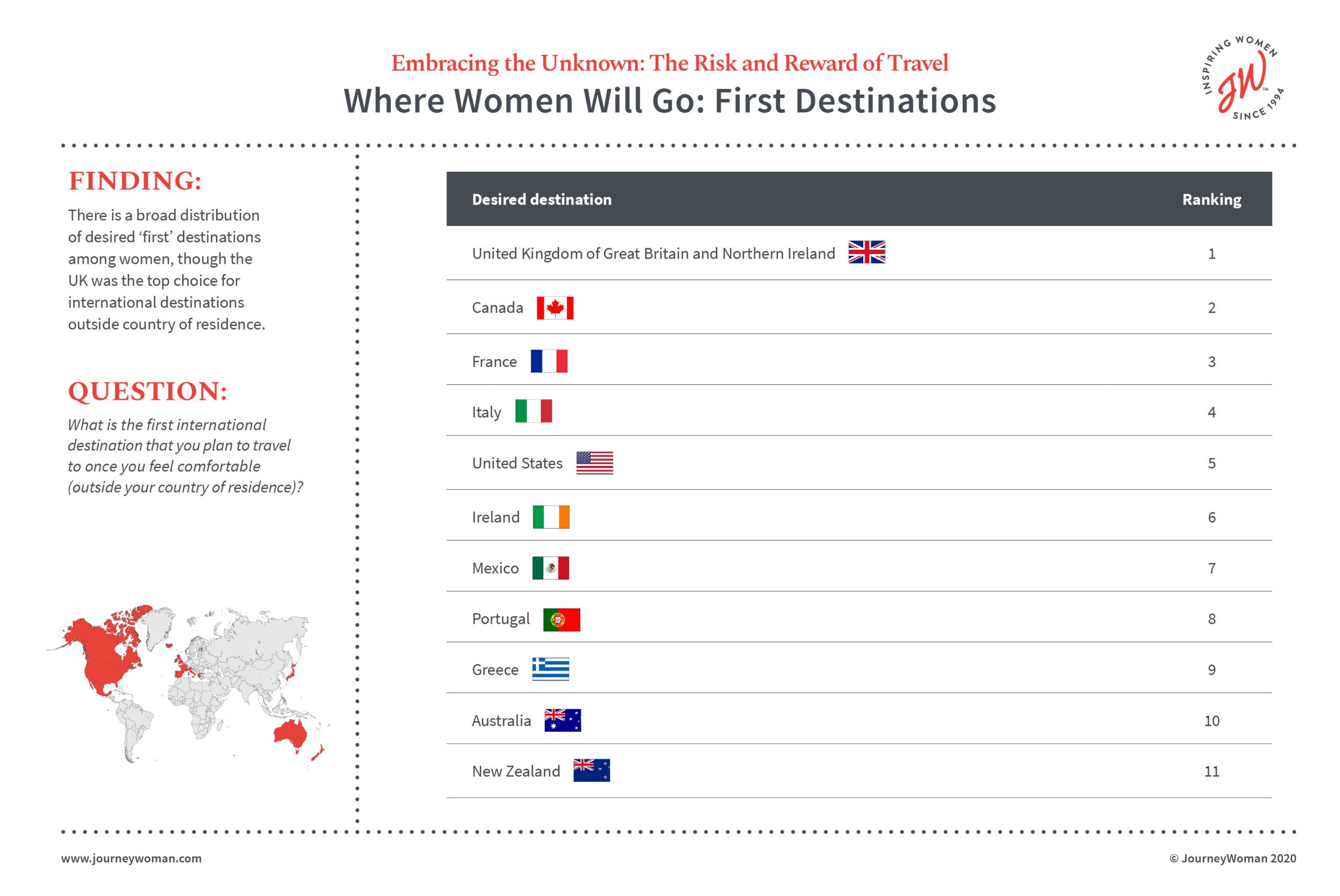
Fascinating findings and I must say I agree. Health & Safety in travelling to and from the destination and the ability of the country’s response to a health or natural crisis will be first and foremost in my mind. I hope the industry takes this report to heart. Thank you for this report.
Thanks Judy for this thoughtful comment! We’re testing some new safety criteria now that we hope will help all women travel safely and well!
I was not surprised to see the percentage of women at 73% who would be willing to pay more for safer travel. I wonder what criteria would make the “safer”travel and how much more women would be willing to pay for it.
Thank you for this thorough, enlightening study and your thoughtful comments on it. As the owner of a small, boutique travel enterprise that guides groups of five women for five days through the lesser known places in Paris, I found it invaluable. I’m subscribing to your newsletter so I won’t miss pertinent articles and information.
This article summarizes well the thoughts I have, as well as those women I travel with regularly. I sincerely hope that our safety is addressed more seriously in the coming months and years. Travel is still in our future, to Canada and the UK. Just the timing is undetermined at this time.
thanks for sharing this